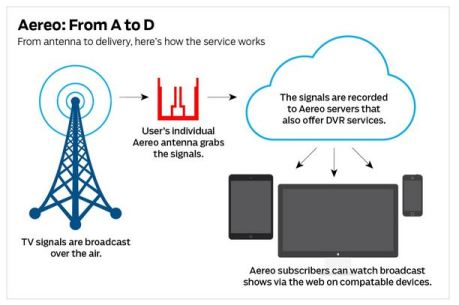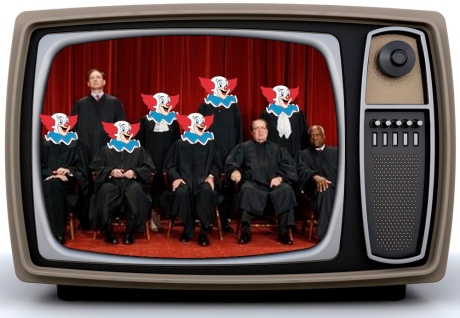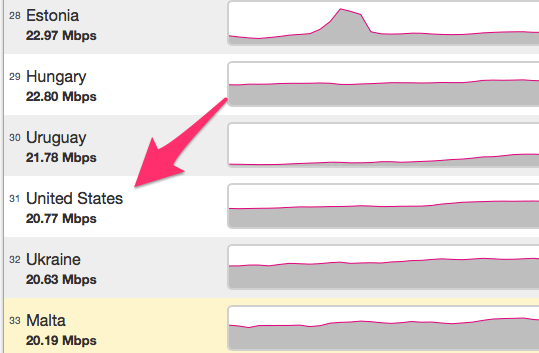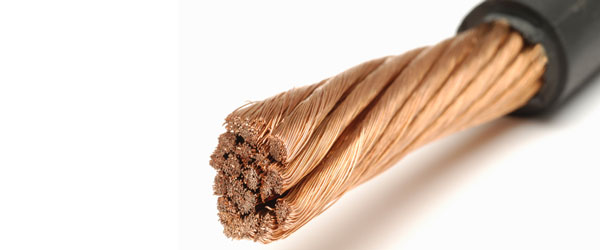Tag Archives: Cable
Data speed record broken with existing copper wire
One of the big problems we are having these days is that our Internet speeds simply aren’t fast enough. If the extent of your Internet usage is reading webpages and checking email then it likely is, but anything beyond that and you’ve probably said to yourself ‘this connection is slow.’ Slow connections can manifest in many ways including blurry video, slow file downloads, long page-load times, and others. Not only that, even if you have a fast connection, many, many other aspects can affect your speeds. Speed of the transmitter, conditions on the network, type of conduit, and so on.
Cable companies offer tiered packages, but do you really get faster speeds? You might, but as any cable company will have written in their agreement with you, those advertised speeds are not guaranteed.
Coupled with the fact that the U.S. lags woefully behind many other countries for high-speed Internet access and the much-vilified potential merger of not just the two largest cable companies in the country but the two most hated as well – Time-Warner and Comcast – the future doesn’t look good. (Below graphic from gottabemobile.com)
But there are some bright spots. Google has been laying down superfast fiber in some cities, and some regional ISPs are doing the same even while those cities try desperately, and I mean desperately, to stop it. Even CenturyLink offers high-speed fiber in some areas of North Las Vegas. Traditional cable companies are scared.
The big problem with fiber is it requires a whole rebuilding of the network infrastructure, ripping up roads, yards, and utilities, putting new hardware in place: The cost for Google alone could rise into the billions, with the cost of a country-wide revamp costing much, much more. And even with fiber, the wire that actually goes into your house, known as the last mile, is still copper although similar advancements have been made there as well.
But there may be hope for us all yet, and perhaps a hidden respite for the beleaguered cable companies. Researchers at Bell Labs managed to create record-breaking speeds of 10 Gigabits per second across plain old copper wire (press release from Alcatel-Lucent at this link). That’s crushingly fast, especially since most of us deal with speed in the Megabits per second, and even fiber provides around 1 Gigabit per second. In other words, it’s one thousand times faster than what most of us deal with right now.
If a technology like this could be deployed, it could be a huge boon. Existing infrastructure could be used, costs could be kept down, availability of fast broadband could be accessible to almost everyone, streets wouldn’t need to be ripped up, and the U.S. could hopefully not be in the embarrassing position of having such poor broadband access. On the other hand, this was a lab experiment, and the L:R ratio (lab-to-reality ratio, a term I just made up) can be years for this kind of thing. Still, it’s a promising development.
It’s all over for Aereo
I suspected it would end like this, but hoped that it wouldn’t. On Wednesday, the Supreme Court sided with broadcasters who had filed a lawsuit against Aereo, a company whose business was to rent you a tiny, dime-sized antenna that resided in their facility, which would in turn stream broadcast network television to your house over the Internet. For $8 a month, you could not only watch the video but record it as well. Below is a diagram of how it works, from deadline.com, which has a thorough and comprehensive Q&A about the company and how it ended up in front of the Supreme Court.
 In effect, Aereo was claiming that because the streams are free in the first place, they are not violating any copyright laws. They’re right on the first part, of course; in fact you can attach any number of broadcast antenna to your house and get network TV for no charge. The broadcasters, however, claimed that it was a violation of copyright law since cable companies are legally bound to pay networks for their content. The Supreme Court agreed, stating in a 6-3 decision that there was no difference between Aereo and a cable company. The dissenting judges stated that because it was the consumer who was doing the watching and Aereo was simply acting as a middleman, the company was not violating any copyright laws.
In effect, Aereo was claiming that because the streams are free in the first place, they are not violating any copyright laws. They’re right on the first part, of course; in fact you can attach any number of broadcast antenna to your house and get network TV for no charge. The broadcasters, however, claimed that it was a violation of copyright law since cable companies are legally bound to pay networks for their content. The Supreme Court agreed, stating in a 6-3 decision that there was no difference between Aereo and a cable company. The dissenting judges stated that because it was the consumer who was doing the watching and Aereo was simply acting as a middleman, the company was not violating any copyright laws.
Again, I suspected this would happen but I’m sad that it did. I cut the cable cord a long time ago, and since all local news streams online anyway and I don’t follow sports (not to mention my spectacular digital media center), it hasn’t been a big deal. But I am someone who believes that many big media companies are clinging too tightly to old business models and they should have found a way to work with Aereo and companies like it to move their business practices and channels forward, rather than continue the pattern of sue-sue-sue. It didn’t work with record labels, whom I actually sided with, and I imagine it won’t work for TV for too much longer.
Also, while researching this article, I found this picture on tapscape.com, which has some good infographics about Aereo, as well as a post that pulls no punches regarding their opinion on the whole thing. In light of the decision, it gave me quite the chuckle.
 One other thing: There are some claims being made that this verdict against Aereo means that the floodgates will open for larger legal actions against cloud services in general. I don’t believe that will happen as Aereo was a specific case and the cloud is so vast, integrated, and critical that it will maintain its existence as it is. If not, well, it would be the Internet equivalent of this.
One other thing: There are some claims being made that this verdict against Aereo means that the floodgates will open for larger legal actions against cloud services in general. I don’t believe that will happen as Aereo was a specific case and the cloud is so vast, integrated, and critical that it will maintain its existence as it is. If not, well, it would be the Internet equivalent of this.
If you are interested in seeing the court’s point of view and why they decided the way they did, you can read their full decision in .pdf form here.


